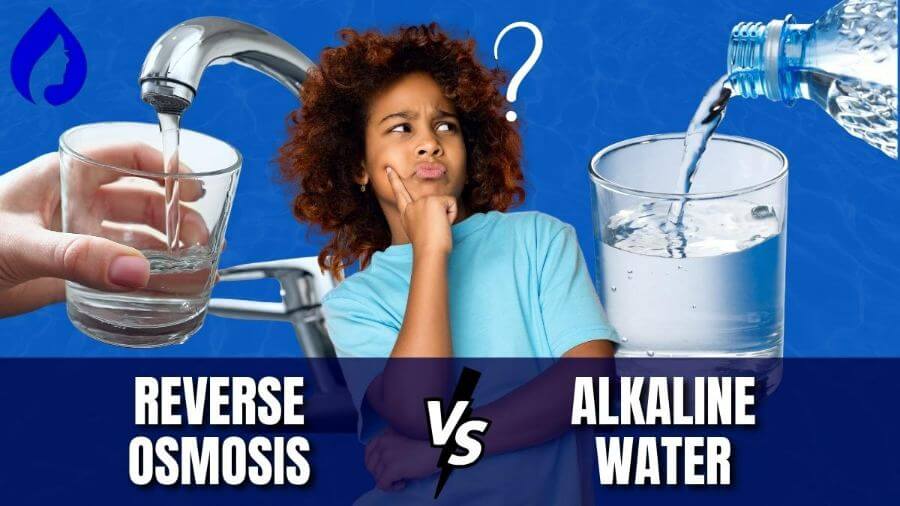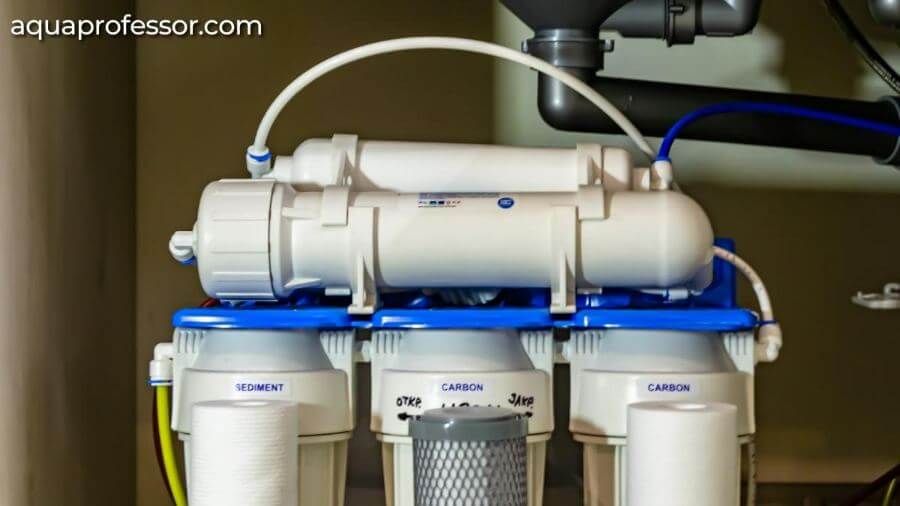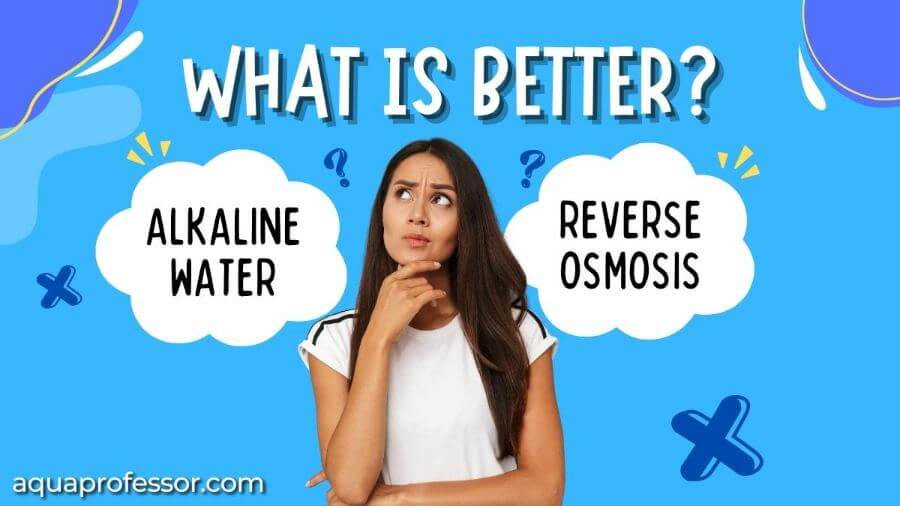
RO water is slightly acidic and lacks minerals, whereas alkaline water is generated naturally or through alkaline water filters. It comprises many healthy minerals and is known for maintaining your body’s mineral and electrolyte balance.
So, drinking alkaline water might help you fight acid reflux. But RO filtration removes harmful contaminants, which countertop alkaline water filters can’t.
But which is healthier to drink? Alkaline or RO?
Continue reading for an in-depth comparison of reverse osmosis vs. alkaline water to decide which is best for your household!
Spoilers ahead 😉
- 🤔 Reverse Osmosis Vs. Alkaline Water: Differences in a Nutshell
- 🥛 Alkaline Water vs RO Water: Preparation
- 👩🔬 PH Level and Mineral Content
- 🎛 Water Wastage During Preparation
- 🦠 Contaminants Removed
- 👨⚕️ Reverse Osmosis Water vs Alkaline Water: Health Benefits
- 👇 Alkaline vs Reverse Osmosis: Key Takeaway
- 📃 Reverse Osmosis VS Alkaline Water: FAQs
🤔 Reverse Osmosis Vs. Alkaline Water: Differences in a Nutshell
| Factors | Alkaline Water | RO Water |
|---|---|---|
| How is it prepared? | Forms naturally in springs/ chemically through an ionizer | Generated by RO filter by pressurizing water into a semi-permeable membrane |
| pH level and mineral content | High | Comparatively low |
| Water wastage during preparation | No water wastage | Significant amounts of water waste |
| Contaminants removed | Allegedly removes sand, chemicals, dust, and other harmful particles | Almost 99% of harmful contaminants, including heavy metals and dangerous bacteria |
| Health benefits | Allegedly contains pro-aging properties, benefits your immune system, reduces acid reflux | Saves you from impurities, remineralizing filters provide beneficial minerals for the well-being |
| Drawbacks | It might be harmful to kidney patients | It lacks alkaline minerals like calcium, generates wastewater, costly |
🥛 Alkaline Water vs RO Water: Preparation

Alkaline and RO water are made through entirely different processes.
🥤 Alkaline Water
It is naturally formed when water travels through various rocks and springs, collects minerals, and hence becomes alkaline by increasing its pH.
However, artificial alkaline water is prepared with the help of an ionizer (called an alkaline water filter) using electrolysis.
Alkaline water filters use electricity to separate the more acidic (low pH) and alkaline (high pH) molecules before releasing the acidic water from the alkaline water filtration machine.
However, researchers doubt that water generated through alkaline water filter systems may not be free of all contaminants. So, RO treatment is necessary.
🚰 Reverse Osmosis Water
A reverse osmosis filtration system comprises a microporous semi-permeable membrane.
Whenever tap water passes through these tiny (0.001 microns) membrane pores, the contaminants (with sizes greater than 0.001 microns) get stuck in the semipermeable membrane, allowing the purified water to pass through.
👩🔬 PH Level and Mineral Content
Since the reverse osmosis water filtration systems generate nearly 100 percent clean water, its pH is 7 (the pH of normal water) inside the machine. However, as soon as the purified water comes out and interacts with air, its pH score reduces to 5 to 5.5, making it acidic.
The pH of alkaline water generated through an alkaline water filtration system is always higher (pH- 8 or 9). Besides, the reverse osmosis systems extract all the minerals in the water, providing you with demineralized water. Therefore, before RO water comsumption, you need to remineralize it.
Nevertheless, alkaline water is mineralized and has a perfect electrolytic balance. It helps you absorb various essential minerals from your diet so that you stay mineral-enriched.
Also Read: Can Drinking RO Water Make You Thirsty?
🎛 Water Wastage During Preparation
During reverse osmosis, water is forced to pass through the system against osmotic pressure, generating back pressure.
This high pressures eliminate all the contaminants from the water and leads to wastewater production, which flows along with the pollutants before they are finally dumped.
So, the entire process results in more water wastage than the water generated. In the case of alkaline water production, there’s no such water wastage.
🦠 Contaminants Removed
Alkaline water filtration removes contaminants like sand, dirt, oil, grease, and other harmful impurities. However, countertop alkaline water filters, like an RO filter, can’t make the water 99 percent pollutant-free.
A reverse osmosis filter is an expert in removing nearly all the unwanted contaminants (like chlorine) from water, which includes:
Also Read: Is Water Softener Better Than RO?
👨⚕️ Reverse Osmosis Water vs Alkaline Water: Health Benefits

🥤 Alkaline Water
Proponents of alkaline water claim the following benefits:
However, none of these claimed benefits are proven by scientific studies except the privilege of getting tasty drinking water.
🥛 Reverse Osmosis Water
The proven benefits of reverse osmosis RO water include:
🛑 Drawbacks
Alkaline water filters/ionizers or bottled alkaline water can be very costly, though they offer only perceived benefits with better-tasting water. Also, kidney patients should avoid alkaline water as it may facilitate kidney stones.
On the other hand, RO water is devoid of vital minerals without remineralization. Moreover, it results in wastewater production.
👇 Alkaline vs Reverse Osmosis: Key Takeaway

A reverse osmosis system removes more contaminants than an alkaline water countertop filter with the help of its semipermeable membrane, but it lacks beneficial minerals and has a bland taste.
On the other hand, alkaline filters retain crucial and healthy minerals and taste better. Hence, you can safely drink RO water only after remineralizing it.
You can alkalize water passed through reverse osmosis technology by:
Today, modern RO systems automatically come with remineralizing filters. If your RO system doesn’t have one, adding an alkaline water filter to your existing RO water purifier can help you get alkaline water benefits.
🔍 Note:
Never opt for artificial alkaline water, as it’s super expensive with no real benefits. Natural alkaline water is better.
📃 Reverse Osmosis VS Alkaline Water: FAQs
Is reverse osmosis water considered alkaline?
No, RO water is not alkaline. It comprises a pH of regular water (7) inside the reverse osmosis machine. However, when it comes out and meets the air, its pH changes to 5 or 5.5, making it slightly acidic.
Can you drink alkaline water every day?
You can drink alkaline water daily for its supposed benefits, like mineral intake for replenishment and improved water taste.
However excessively drinking any type of water can lead to nausea and vomiting. So beware of that!
Is reverse osmosis water bad for the kidneys?
No, reverse osmosis water is not bad for the kidneys. In fact, reverse osmosis can be beneficial as it removes heavy metals that can harm kidneys.
However, reverse osmosis water quality, though up to the mark, lacks minerals. So, adding enough minerals to it is beneficial in the long run.
Does reverse osmosis water dehydrate you?
No, reverse osmosis water is not dehydrating. However, its lack of healthy mineral content and electrolytes makes the water less hydrated. Thus, improper hydration may affect your health in the long term.
You can make your RO water refreshing by remineralizing it.
Can alkaline water hurt your kidneys?
No, alkaline water doesn’t hurt your kidneys unless you have kidney disease. However, there’s no conclusive scientific evidence that it helps kidney function either.
Adarsh is a Health & Nutrition Sciences graduate with expertise in environmental health. He is associated with ventures like Glacier Fresh Filter and Simpure Filter Systems. Through Aqua Professor, he intends to provide helpful information to every home to help them make smarter decisions.

Hello,
Earlier we have Ro and now we want to buy either new RO machine or New alkaline water generating machine. Can you please help which is better for our day to day life.
Regards
Meeta
Hey Meeta, Alkaline water is good for a refreshing taste. You can make RO water alkaline using baking soda or alkaline powders.